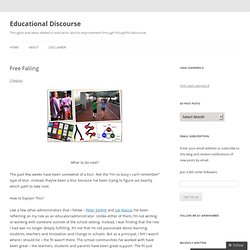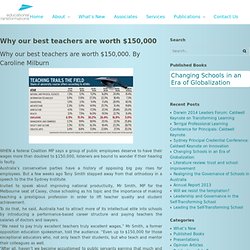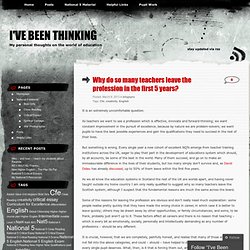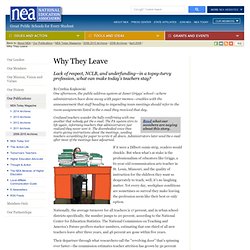

Free Falling. What to do next?

The past few weeks have been somewhat of a blur. Not the “I’m so busy I can’t remember” type of blur. Instead, they’ve been a blur because I’ve been trying to figure out exactly which path to take next. How to Explain This? Like a few other administrators that I follow – Peter DeWitt and Joe Mazza, I’ve been reflecting on my role as an educator/administrator. I’ve been a principal in 9 different schools over 13 schools. Millions wasted training teachers. Educational TransformationsEducational Transformations. WHEN a federal Coalition MP says a group of public employees deserve to have their wages more than doubled to $150,000, listeners are bound to wonder if their hearing is faulty.

Australia’s conservative parties have a history of opposing big pay rises for employees. But a few weeks ago Tony Smith stepped away from that orthodoxy in a speech to the the Sydney Institute. Invited to speak about improving national productivity, Mr Smith, MP for the Melbourne seat of Casey, chose schooling as his topic and the importance of making teaching a prestigious profession in order to lift teacher quality and student achievement.
To do that, he said, Australia had to attract more of its intellectual elite into schools by introducing a performance-based career structure and paying teachers the salaries of doctors and lawyers. “We need to pay truly excellent teachers truly excellent wages,” Mr Smith, a former opposition education spokesman, told the audience. Why our teachers want to leave. Not all teachers enjoy their work like SA Public Teaching Awards nominee Steve Walsh, of Glenunga International High Schoo Source: The Advertiser NEARLY two-thirds of Australian teachers are considering quitting their jobs for a new career.

The Centre for Marketing Schools was commissioned to survey staff satisfaction levels of 850 teachers in government and non-government schools in South Australia, New South Wales, Victoria, Tasmania and Western Australia. Centre for Marketing Schools director Dr Linda Vining said the survey confirmed the "deeper issues" of concern to teachers. Save Our Schools Australia: High Attrition from Teach for Australia.
High Attrition from Teach for Australia Saturday January 14, 2012 According to The Age (12 January 2012) nearly half of participants in the fast-track Teach for Australia program are no longer teaching after two years.

Only 56% of those who entered the program are still teaching after their initial two-year commitment. Of the 45 graduates who began the two-year program in 2010, two dropped out in the first year, nine are going into another industry, nine are doing something else in the education field, such as a master’s of teaching, and 25 remain teaching. This is a very high attrition rate. Teach for Australia places non-teaching graduates in disadvantaged schools for two years after six weeks of training.
The attrition rate from Teach for Australia is even higher than that of its parent program in the United States – Teach for America – which has been heavily criticised because so many leave after their initial commitment. Epress.lib.uts.edu.au/research/bitstream/handle/10453/11831/2009004993OK.pdf?sequence=1. More teachers, but fewer staying the course. Ro.ecu.edu.au/cgi/viewcontent.cgi?article=1512&context=ajte. Prijipati.library.usyd.edu.au/bitstream/2123/4529/1/Vol8No1Article1.pdf. More teachers, but fewer staying the course. High Teacher Turnover Rates are a Big Problem for America’s Public Schools.
Do Half Of New Teachers Leave The Profession Within Five Years? You’ll often hear the argument that half or almost half of all beginning U.S. public school teachers leave the profession within five years.

The implications of this statistic are, of course, that we are losing a huge proportion of our new teachers, creating a “revolving door” of sorts, with teachers constantly leaving the profession and having to be replaced. This is costly, both financially (it is expensive to recruit and train new teachers) and in terms of productivity (we are losing teachers before they reach their peak effectiveness). And this doesn’t even include teachers who stay in the profession but switch schools and/or districts (i.e., teacher mobility).* Needless to say, some attrition is inevitable, and not all of it is necessarily harmful, Many new teachers, like all workers, leave (or are dismissed) because they are just aren’t good at it – and, indeed, there is test-based evidence that novice leavers are, on average, less effective.
‘Wasted Investment? Why do so many teachers leave the profession in the first 5 years?’ Why do so many teachers leave the profession in the first 5 years? It is an extremely uncomfortable question.

As teachers we want to see a profession which is effective, innovate and forward-thinking; we want constant improvement in the pursuit of excellence, because by nature we are problem-solvers; we want pupils to have the best possible experiences and gain the qualifications they need to succeed in the rest of their lives. Mass exodus of the educators. Supported … (from left) the St Paul's Grammar director of planning and organisation, Karen Keogh, with teachers Sarah Blaszczyk and Dominique Anderson.

Just one in 10 teachers in the NSW public school system leave the job in their first five years, according to NSW government budget figures released in June. If this is to be believed, then those running education systems around the world should be beating a path to Macquarie Street to find out how the government is so successful at retaining teachers. The problem is it doesn't provide an accurate picture of reality. That's according to a researcher from Monash University, Dr Philip Riley, who says, ''Young teachers leave but keep up their registration as a kind of insurance policy. School's out early for overworked and undersupported young teachers. Close to 50% of Australians who graduate as teachers leave the profession within the first five years, many citing overwhelming workloads and unsupportive staffrooms as their main reason for leaving the job, according to new research.

The apparent exodus of early career teachers is a significant drain on resources, says Dr Philip Riley, of Monash University’s faculty of education, who is leading Monash’s research into the reasons that lead to young educators resigning at an alarming rate. “It’s costing the nation a huge amount of money. Hey politicians, leave those teachers alone - The Drum Opinion. Find More Stories Hey politicians, leave those teachers alone Jane Caro Making it harder to enter teaching while continuing to throw graduates to the lions won't solve anything.

Why They Leave. By Cynthia Kopkowski One afternoon, the public address system at Janet Griggs' school—where administrators have done away with paper memos—crackles with the announcement that staff heading to impending team meetings should refer to the room assignments listed in the e-mail they received that day.

Confused teachers wander the halls confirming with one another that nobody got the e-mail. The PA system stirs to life again, informing teachers that administrators just realized they never sent it. The disembodied voice then starts giving instructions about the meetings, sending teachers scrambling for paper to write it all down. Administrators later send the e-mail after most of the meetings have adjourned.